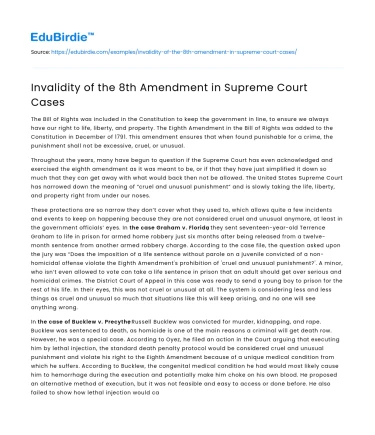The Bill of Rights was included in the Constitution to keep the government in line, to ensure we always have our right to life, liberty, and property. The Eighth Amendment in the Bill of Rights was added to the Constitution in December of 1791. This amendment ensures that when found punishable for a crime, the punishment shall not be excessive, cruel, or unusual.
Throughout the years, many have begun to question if the Supreme Court has even acknowledged and exercised the eighth amendment as it was meant to be, or if that they have just simplified it down so much that they can get away with what would back then not be allowed. The United States Supreme Court has narrowed down the meaning of “cruel and unusual punishment” and is slowly taking the life, liberty, and property right from under our noses.
Save your time!
We can take care of your essay
- Proper editing and formatting
- Free revision, title page, and bibliography
- Flexible prices and money-back guarantee
These protections are so narrow they don’t cover what they used to, which allows quite a few incidents and events to keep on happening because they are not considered cruel and unusual anymore, at least in the government officials’ eyes. In the case Graham v. Florida, they sent seventeen-year-old Terrence Graham to life in prison for armed home robbery just six months after being released from a twelve-month sentence from another armed robbery charge. According to the case file, the question asked upon the jury was “Does the imposition of a life sentence without parole on a juvenile convicted of a non-homicidal offense violate the Eighth Amendment's prohibition of 'cruel and unusual punishment?'. A minor, who isn’t even allowed to vote can take a life sentence in prison that an adult should get over serious and homicidal crimes. The District Court of Appeal in this case was ready to send a young boy to prison for the rest of his life. In their eyes, this was not cruel or unusual at all. The system is considering less and less things as cruel and unusual so much that situations like this will keep arising, and no one will see anything wrong.
In the case of Bucklew v. Precythe, Russell Bucklew was convicted for murder, kidnapping, and rape. Bucklew was sentenced to death, as homicide is one of the main reasons a criminal will get death row. However, he was a special case. According to Oyez, he filed an action in the Court arguing that executing him by lethal injection, the standard death penalty protocol would be considered cruel and unusual punishment and violate his right to the Eighth Amendment because of a unique medical condition from which he suffers. According to Bucklew, the congenital medical condition he had would most likely cause him to hemorrhage during the execution and potentially make him choke on his own blood. He proposed an alternative method of execution, but it was not feasible and easy to access or done before. He also failed to show how lethal injection would cause him severe excess pain, causing the Court to reject his argument.






 Stuck on your essay?
Stuck on your essay?

